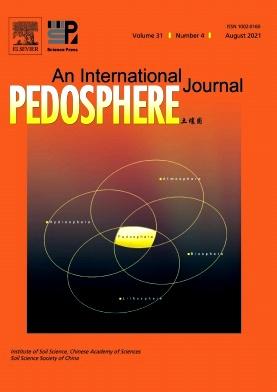Soil holobiont interplay and its role in protecting plants against salinity stress
IF 7.3
2区 农林科学
Q1 SOIL SCIENCE
引用次数: 0
Abstract
Salinity poses a significant challenge to global agricultural productivity, impacting plant growth, yield, soil fertility, and the composition of soil microbial communities. Moreover, salinity has a significant impact in shifting soil microbial communities and their functional profiles. Therefore, we explored and analyzed the intricate relationships among plant-associated microbes/microbiome, including plant growth-promoting bacteria, arbuscular mycorrhizal fungi (AMF), archaea, and viruses in alleviating salinity stress in plants. In this review, we have highlighted that salinity stress selectively enhances the growth of certain microbes such as Gammaproteobacteria, Bacteroidetes, Firmicutes, Acidobacteria, Euryarchaeota, Thaumarchaeota, Crenarchaeota, and lysogenic viruses, while decreasing the abundances of others (Alphaproteobacteria and Betaproteobacteria) and AMF root colonization. These microbes regulate water and nutrient uptake, decrease ionic and osmotic toxicity, enhance the syntheses of antioxidant enzymes (catalase and glutathione S-transferases) and osmolytes (erythrose and galactinol), increase phytohormone (indole-3 acetic acid) production, and activate salinity stress tolerance genes (SOD, APX, and SKOR) in plants. Furthermore, we meticulously examined the significance of soil microbiome and the need for multidisciplinary omics studies on the changes in soil microbiome composition and the relationships of synergistic holobiont in mitigating salinity stress in plants. Such studies will provide insights into the use of microbial components as a sustainable and eco-friendly approach to modulate salinity stress and enhance agricultural productivity.
土壤整体生物的相互作用及其在保护植物免受盐碱胁迫方面的作用
盐度对全球农业生产力构成重大挑战,影响植物生长、产量、土壤肥力和土壤微生物群落组成。此外,盐度对土壤微生物群落及其功能分布有显著影响。因此,我们探索和分析了植物相关微生物/微生物组之间的复杂关系,包括植物生长促进菌、丛枝菌根真菌(AMF)、古细菌和病毒在缓解植物盐胁迫中的作用。在这篇综述中,我们强调了盐度胁迫选择性地促进了某些微生物的生长,如Gammaproteobacteria、Bacteroidetes、Firmicutes、Acidobacteria、Euryarchaeota、Thaumarchaeota、Crenarchaeota和溶原病毒,同时降低了其他微生物(Alphaproteobacteria和Betaproteobacteria)的丰度和AMF的根定殖。这些微生物调节植物对水分和养分的吸收,降低离子和渗透毒性,促进抗氧化酶(过氧化氢酶和谷胱甘肽s -转移酶)和渗透酶(红细胞和半乳糖醇)的合成,增加植物激素(吲哚-3乙酸)的产生,并激活盐胁迫耐受基因(SOD, APX和SKOR)。此外,我们还仔细研究了土壤微生物组的重要性,以及对土壤微生物组组成变化和协同全息剂在减轻植物盐胁迫中的关系进行多学科组学研究的必要性。这些研究将为利用微生物成分作为一种可持续和生态友好的方法来调节盐度胁迫和提高农业生产力提供见解。
本文章由计算机程序翻译,如有差异,请以英文原文为准。
求助全文
约1分钟内获得全文
求助全文
来源期刊

Pedosphere
环境科学-土壤科学
CiteScore
11.70
自引率
1.80%
发文量
147
审稿时长
5.0 months
期刊介绍:
PEDOSPHERE—a peer-reviewed international journal published bimonthly in English—welcomes submissions from scientists around the world under a broad scope of topics relevant to timely, high quality original research findings, especially up-to-date achievements and advances in the entire field of soil science studies dealing with environmental science, ecology, agriculture, bioscience, geoscience, forestry, etc. It publishes mainly original research articles as well as some reviews, mini reviews, short communications and special issues.
 求助内容:
求助内容: 应助结果提醒方式:
应助结果提醒方式:


